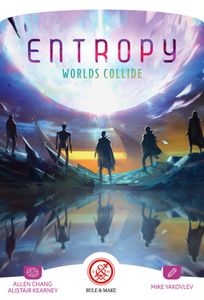Entropy: Worlds Collide is a very quick-playing card game of simple set-collection and not-so-simple actions, because you can’t do the same thing another player wants to do on the same turn. These “clashes” can result in players repeatedly unable to do anything – unless one of them takes the card that resolves clashes in their favor, which can spur a whole new set of fighting over who gets that card.
Entropy has players take one of six potential character cards, each with a unique ability, and asks players to collect the four cards (called “shards”) representing that player’s “reality.” The players are supposed to be characters from parallel universes whose realities have become jumbled, and thus must fight to be the first to reassemble one’s reality – placing all four shards face up – to win the game. The four shards from each player’s reality are shuffled into a central deck (the “nexus”) along with four cards from another, unused reality, plus one wild shard, and each player starts the game with one such card, face down, in his/her “hold.”
Each player has the same set of six action cards, numbered 1 through 6. Once you play an action card, you discard it to the table in front of you, and can’t reuse it until you have used all your actions or played your Reset (card 5) action. Card 1 allows you to use your character’s ability. Card 2 allows you to flip over one face-down card anywhere on the board – including in another player’s hold. Card 3 lets you take the top two cards from the nexus and place one in your hold (discarding what’s already there if you have one). Card 4 lets you take a shard from anywhere on the table – the nexus, the discard pile, or an opponent – except from an opponent’s reality. Once a card is played to someone’s reality, it’s there for the rest of the game. Card 5 is the aforementioned reset, and Card 6 lets you take the Anchor card.
Players all play their actions simultaneously, but if two or more try to play the same action, they clash and no one gets to play that round – unless one of those clashing players has the Anchor card. If you have the Anchor, you win any clash and can take the action in question, while everyone else in the clash has to sit the round out. So the game truly hinges on the Anchor, which starts the game in the middle of the table but should change hands frequently (unless you want one player to run away with things).
Because the deck of shards is so small and you can go through the discard pile, there isn’t much deduction involved in collecting your cards, other than perhaps trying to guess what’s in other players’ holds. The deduction in this game is around the action selections – you need to figure out what other players need to play, and then try to play something different, unless you have the Anchor.
 Entropy is a light, diversionary game, although I think it aspires to a bit more. The clashes would seem to invite negotiation (and lying), but there’s no direct mechanism for this in the game, and no currency to use to try to ensure compliance or convince someone else to do what you want. There are certain character/action combinations that seem overly strong, such as the character who can play an action and force all other players to discard that action card … which, if you do it with Reset, kind of blows the other players out of the game.
Entropy is a light, diversionary game, although I think it aspires to a bit more. The clashes would seem to invite negotiation (and lying), but there’s no direct mechanism for this in the game, and no currency to use to try to ensure compliance or convince someone else to do what you want. There are certain character/action combinations that seem overly strong, such as the character who can play an action and force all other players to discard that action card … which, if you do it with Reset, kind of blows the other players out of the game.
Entropy: Worlds Collide also has a separate expansion called Echo of Time that introduces a second storyline, some new roles, a one-versus-many option, a way to play with five players (although the rules warn you there will be many clashes), and a second, stronger Anchor card for players to fight over. We found Entropy enjoyable, but a filler game, and probably not one we’ll go back to a ton because there seem to be little imbalances in the game play. The game was available at Rule & Make’s booth at GenCon but won’t ship to buyers until December 2017. The publishers do have another game out, Skyward, that we like a lot more, and that will be the subject of my next review for Paste in early November.